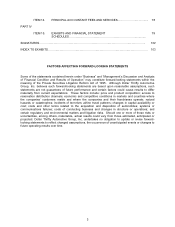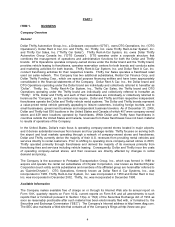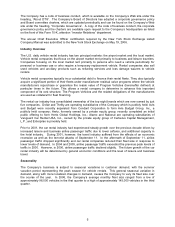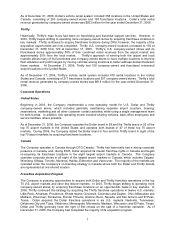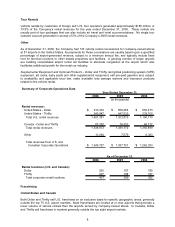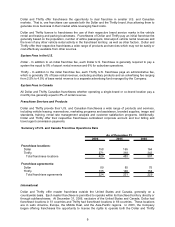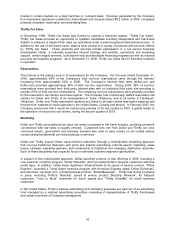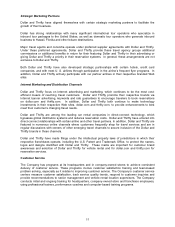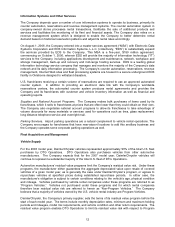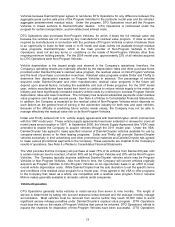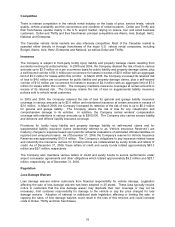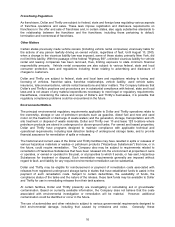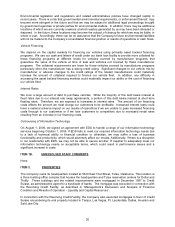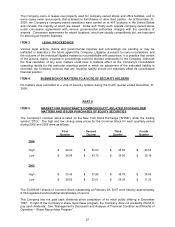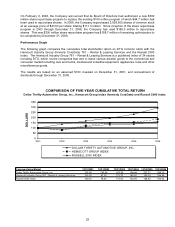Thrifty Car Rental 2006 Annual Report Download - page 19
Download and view the complete annual report
Please find page 19 of the 2006 Thrifty Car Rental annual report below. You can navigate through the pages in the report by either clicking on the pages listed below, or by using the keyword search tool below to find specific information within the annual report.Vehicles because DaimlerChrysler agrees to reimburse DTG Operations for any difference between the
aggregate gross auction sale price of the Program Vehicles for the particular model year and the vehicles’
aggregate predetermined residual value. Under the program, DTG Operations must sell the Program
Vehicles in closed auctions to DaimlerChrysler dealers. DTG Operations is reimbursed under the
program for certain transportation, auction-related and interest costs.
DTG Operations also purchases Non-Program Vehicles, for which it bears the full residual value risk
because the vehicles are not covered by any manufacturer’s residual value program. It does so when
required by manufacturers in connection with the purchase of Program Vehicles or when it believes there
is an opportunity to lower its fleet costs or to fill model and class niches not available through residual
value programs. DaimlerChrysler, which is the main provider of Non-Program Vehicles to DTG
Operations, does not set any terms or conditions on the resale of Non-Program Vehicles other than
requiring minimum holding periods. For the 2006 model year, approximately 32% of all vehicles acquired
by DTG Operations were Non-Program Vehicles.
Vehicle depreciation is the largest single cost element in the Company’s operations; therefore, the
Company’s operating results are materially affected by the depreciation rates and other purchase terms
provided under DaimlerChrysler’s residual value program, the residual values on Non-Program Vehicles
and the level of purchase or promotion incentives. Residual value programs enable Dollar and Thrifty to
determine their depreciation expense on Program Vehicles in advance. The percentage of vehicles
acquired under DaimlerChrysler and other manufacturers’ residual value programs in the future will
depend upon several factors, including the availability and cost of these programs. For the 2007 model
year, vehicle manufacturers have stated their intent to continue to reduce vehicle supply to the rental car
industry and have significantly increased industry vehicle costs by continuing to increase Program Vehicle
depreciation rates and lower incentives. The Company has received substantial payments under residual
value programs over the past several years. See Note 6 of Notes to Consolidated Financial Statements.
In addition, the Company is impacted by the residual value of Non-Program Vehicles which depends on
such factors as the general level of pricing in the automotive industry for both new and used vehicles.
Because of the difficulty in predicting future vehicle resale values, the Company may not be able to
manage effectively the residual value risk on its Non-Program Vehicles.
Dollar and Thrifty entered into U.S. vehicle supply agreements with DaimlerChrysler, which commenced
with the 1997 model year. These vehicle supply agreements have been extended or renewed to cover all
model years since inception in 1997. In September 2006, the Vehicle Supply Agreement (the “VSA”) was
amended to enable the Company to acquire vehicles through the 2011 model year. Under the VSA,
DaimlerChrysler has agreed to make specified volumes of DaimlerChrysler vehicles available for use by
company-owned stores or for fleet leasing programs. Dollar and Thrifty will promote DaimlerChrysler
vehicles exclusively in their advertising and other promotional materials and DaimlerChrysler has agreed
to make various promotional payments to the Company. These payments are material to the Company’s
results of operations. See Note 6 of Notes to Consolidated Financial Statements.
The VSA provides that the Company will purchase at least 75% of its vehicles from DaimlerChrysler until
a certain minimum level is reached, of which 80% will be Program Vehicles and 20% will be Non-Program
Vehicles. The Company typically acquires additional DaimlerChrysler vehicles which may be Program
Vehicles or Non-Program Vehicles. Also from time to time, the Company will convert vehicles originally
acquired as Program Vehicles to Non-Program Vehicles on an opportunistic basis in an effort to lower
overall vehicle depreciation costs. While DaimlerChrysler has the sole discretion to set the specific terms
and conditions of its residual value program for a model year, it has agreed in the VSA to offer programs
to the Company that, taken as a whole, are competitive with a residual value program Ford or General
Motors makes generally available to domestic vehicle rental companies.
Vehicle Disposition
DTG Operations generally holds vehicles in rental service from seven to nine months. The length of
service is determined by taking into account seasonal rental demand and the average monthly mileage
accumulation. Most vehicles must be removed from service before they reach 30,000 miles to avoid
significant excess mileage penalties under DaimlerChrysler’s residual value program. DTG Operations
must bear the risk on the resale of Program Vehicles that cannot be returned. DTG Operations’ efforts to
expand the channels for disposition of Non-Program Vehicles have been successful. DTG Operations
13


